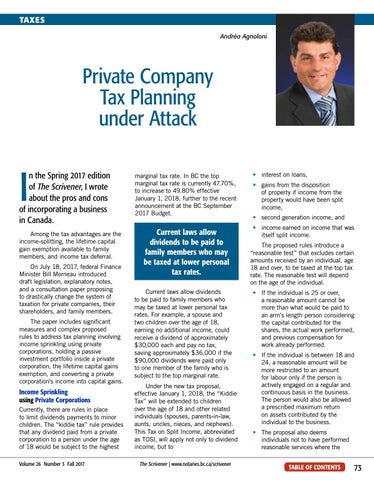TAXES Andréa Agnoloni
Private Company Tax Planning under Attack
I
n the Spring 2017 edition of The Scrivener, I wrote about the pros and cons of incorporating a business in Canada. Among the tax advantages are the income-splitting, the lifetime capital gain exemption available to family members, and income tax deferral. On July 18, 2017, federal Finance Minister Bill Morneau introduced draft legislation, explanatory notes, and a consultation paper proposing to drastically change the system of taxation for private companies, their shareholders, and family members. The paper includes significant measures and complex proposed rules to address tax planning involving income sprinkling using private corporations, holding a passive investment portfolio inside a private corporation, the lifetime capital gains exemption, and converting a private corporation’s income into capital gains.
Income Sprinkling using Private Corporations Currently, there are rules in place to limit dividends payments to minor children. The “kiddie tax” rule provides that any dividend paid from a private corporation to a person under the age of 18 would be subject to the highest Volume 26 Number 3 Fall 2017
marginal tax rate. In BC the top marginal tax rate is currently 47.70%, to increase to 49.80% effective January 1, 2018, further to the recent announcement at the BC September 2017 Budget.
Current laws allow dividends to be paid to family members who may be taxed at lower personal tax rates. Current laws allow dividends to be paid to family members who may be taxed at lower personal tax rates. For example, a spouse and two children over the age of 18, earning no additional income, could receive a dividend of approximately $30,000 each and pay no tax, saving approximately $36,000 if the $90,000 dividends were paid only to one member of the family who is subject to the top marginal rate. Under the new tax proposal, effective January 1, 2018, the “Kiddie Tax” will be extended to children over the age of 18 and other related individuals (spouses, parents-in-law, aunts, uncles, nieces, and nephews). This Tax on Split Income, abbreviated as TOSI, will apply not only to dividend income, but to The Scrivener | www.notaries.bc.ca/scrivener
• interest on loans, • gains from the disposition of property if income from the property would have been split income, • second generation income, and • income earned on income that was itself split income. The proposed rules introduce a “reasonable test” that excludes certain amounts received by an individual, age 18 and over, to be taxed at the top tax rate. The reasonable test will depend on the age of the individual. • If the individual is 25 or over, a reasonable amount cannot be more than what would be paid to an arm’s length person considering the capital contributed for the shares, the actual work performed, and previous compensation for work already performed. • If the individual is between 18 and 24, a reasonable amount will be more restricted to an amount for labour only if the person is actively engaged on a regular and continuous basis in the business. The person would also be allowed a prescribed maximum return on assets contributed by the individual to the business. • The proposal also deems individuals not to have performed reasonable services where the TABLE OF CONTENTS
73
